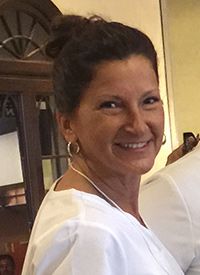Oncology Nurse Turned Activist Finds Inspiration After Burnout
Sharon Mitchell, RN, stood up for her profession at Pennsylvania’s first-ever Nurses Safe Staffing Summit in Harrisburg, Pennsylvania on July 30-31, speaking and participating in an event to draw attention to safe staffing bills.
Sharon Mitchell, RN

Sharon Mitchell, RN
Sharon Mitchell, RN, from the Wilkes Barre/Scranton area of Pennsylvania, has been a nurse for 26 years, having worked in oncology in inpatient, outpatient, and clinical research capacities. She recently returned to the bedside and was disappointed to find that she couldn’t be the nurse she wanted to be anymore. Nurses were being assigned more patients, asked to do more with less, and as she watched her colleagues burn out quickly, she began to contemplate leaving the profession.
“With oncology patients, you need time to sit (and) educate them, and their families,” she said. “We see the same patients and develop a relationship with them. Giving emotional support, letting them know they are not being rushed, and not just a number, I love to do that. The ability to ease their anxiety is so rewarding. It’s heart-wrenching to not have that time.”
Mitchell added that many nurses are leaving the profession, including young nurses, after feeling burnt out from the fast pace and expectations that they should be able to handle the workload. Nurses often feel ashamed that they can’t keep up; but they are afraid to rock the boat out of fear of being targeted or losing their jobs.
“We like to be busy, but when it affects patient safety, we can’t continue to let this happen and complain. We need to do something about it,” Mitchell said.
She wondered if there was a way to make a change. “I’ve never imagined myself as an activist, or a public speaker. I’ll speak out if something needs to be said.”
Mitchell was asked to be on the planning committee for Pennsylvania’s first-ever Nurses Safe Staffing Summit in Harrisburg, Pennsylvania’s capitol. The event was led by Nurses of PA, which describes itself as a non-profit, non-partisan movement of union and non-union nurses who are leading the charge for safe staffing laws.
At the Summit, held July 30-31, over 100 nurses from Pennsylvania dressed in scrubs and rushed over 10,000 petitions by ambulance into the state capitol, carrying them on gurneys, in support of House Bill 1500 and Senate Bill 214, entitled, "An Act Amending the Act of July 19, 1979 (P.L.130, No.48), Known as the Health Care Facilities Act, Providing for Hospital Patient Protection.” This legislation would limit the number of patients a nurse can be asked to care for at one time. The bills have support from numerous legislators and Pennsylvania Governor Tom Wolf.
According to the most recent Pennsylvania Department of Health licensure survey, the biggest contributing factor to nurse burnout and turnover is short-staffing, and the most common reason for nurses under 50 to leave the profession is stress and burnout.1
“Politicians don’t understand how critical this matter is. Patients are receiving cytotoxic drugs with the potential for reactions that can mean life or death, and nurses can’t get there fast enough,” Mitchell said.
This was Mitchell’s first time participating and serving as a speaker in a rally and event like this—an experience she found empowering. “Seeing so many nurses from across the state, every county represented, standing up for patient safety—there was a sense of unity. It made me proud to be a nurse, and it gave me hope. It feels good to know I’m doing something for patients and my profession. It inspired me to continue in nursing when I was thinking about leaving.”
It doesn’t require much time to get involved. Writing letters and making phone calls to legislators can be done in minutes, for example. There are many things busy nurses can do to protect their patients, and it only takes a little effort to find that it’s encouraging, inspiring, and empowering.
Mitchell’s has one message to other oncology nurses who feel their patient loads are too heavy or unsafe: Become involved.
“We are the voice of our patients. It’s our duty to get involved, to not back down,” she said. “You know what’s safe and what’s not. We are educated professionals. This is such a vulnerable population. Become actively involved, identify the problem, and make a change with hospital administration. You are protecting your patients, and patients deserve that.”
Mitchell added that nurses owe it to themselves, too. “There is nothing more rewarding as a nurse, than taking the burden off a person with cancer, when they look for you because you gave them that unrushed time,” she said. “It truly makes a difference, whether they are in treatment or at the end of life. When that is stripped from us, it has to stop. We need safer staffing.”
Reference
1. 2012/13 Pulse of PA Registered Nurse Workforce. Bureau of Health Planning, Division of Plan Development. PA Department of Health website.
health.pa.gov/topics/Documents/Programs/Workforce%20Reports/2012-2013%20Pulse%20of%20PA%20Registered%20Nurse%20Workforce%20Report%20Final.pdf. Accessed August 2, 2018.



